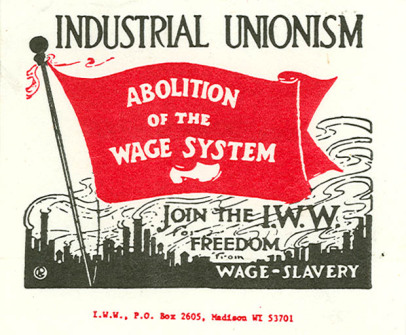This year’s May Day sermon is an expanded version of a speech I gave this morning at the dedication by Alderman Carlos Ramirez Rosa of Chicago’s 35th Ward of an honorary street named for the great radical freedom fighter Lucy Parsons.
We’re all here today because of Lucy Gonzalez Parsons. And when I say we’re here today because of her, I don’t mean just because we’ve come together to dedicate this street to the memory of one of the most important figures in the rich history of Chicago radicals. I mean that we are literally here today because of her, because it was Lucy Gonzalez Parsons who organized and led the very first May Day celebration in American history. It was her unyielding efforts and her relentless dedication to the cause of labor that marked May 1st as the day we recognize the ongoing struggle of working men and women all across this country.
Lucy had one of the most unlikely origins of any figure in history. Born a slave in Texas, she married a Confederate soldier – a man forced to fight for the institution that caused her misery. But Albert Parsons was no ordinary southerner, and Lucy was no ordinary slave. Together, they rebelled against the bigotry of their surroundings, the institutional racism of the slave economy, and the cruelty of unchecked capitalism. Freeing oppression in the South, they found themselves in this city, and soon learned that it could be just as inhospitable to those who sought radical change.
They had been married for 15 years when Albert, one of the most prominent figures in Chicago’s labor movement, was named as a conspirator in the Haymarket affair and was wrongly convicted by a jury fed propaganda by the anti-union newspapers and bosses. He was executed a year later, and while Lucy lost her husband, she lost none of her passion for the liberation of humanity from cruelty and deprivation. Many people would have given up after such a blow, but Lucy was no ordinary woman. She wrote afterwards that she had drunk the cup of sorrow to its dregs”, but she was still a rebel, and would remain one all her life. For the next 55 years, she would fight for worker’s rights both at home and abroad; write hundreds of papers and speeches defending the oppressed, the exploited, and the unjustly accused; and campaign tirelessly for the working class.
By dedicating this place to Lucy Gonzalez Parsons, we not only try our best to honor her memory, but to remind ourselves that her struggle is far from over – in fact, it is more important now than it has ever been. Over a hundred years ago, Lucy was fighting with unimaginable bravery not only for the rights of working men and women, but for immigrants, for African-Americans and Natives and Latinas, for those in her own country and those overseas, for the homeless and others who found themselves on the margins of society. She believed, as we do, that the rights of the working class can never be separated from the rights of everyone. We can see more clearly than ever that her struggle is our struggle.
So let’s give her memory the highest compliment it could receive, by letting Lucy Gonzalez Parsons speak for herself: “Governments,” she wrote, “do not lead. They follow progress. When the prison, the stake, or the scaffold can no longer silence the voice of the protesting minority, progress moves on a step.” We owe to her to help progress move forward one more step, and then another, and another, until we are all truly free. Thank you.

